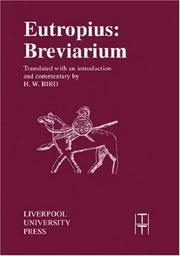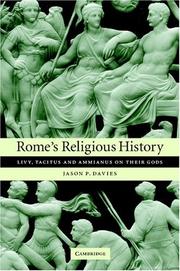| Listing 1 - 10 of 24 | << page >> |
Sort by
|

ISBN: 3445023565 9783445023568 Year: 1985 Volume: Heft 169 Publisher: Königstein im Taunus Hain
Abstract | Keywords | Export | Availability | Bookmark
 Loading...
Loading...Choose an application
- Reference Manager
- EndNote
- RefWorks (Direct export to RefWorks)
Dueling --- History --- Livy. --- Livy --- Criticism and interpretation --- Rome --- Histoire --- Livy Ab urbe condita --- Livy. Ab urbe condita --- -Duels --- Fighting --- Chivalry --- Martial arts --- Combat --- Wager of battle --- History. --- Livy. Ab urbe condita. --- -History --- Duels --- Tite-Live / et combat singulier. --- Livius (Titus) / en tweegevecht. --- Criticism and interpretation. --- Livy - Ab urbe condita --- Tite-Live --- Rome - History

ISBN: 0853232083 9780853232087 Year: 2011 Volume: 14 Publisher: Liverpool : Liverpool university press,
Abstract | Keywords | Export | Availability | Bookmark
 Loading...
Loading...Choose an application
- Reference Manager
- EndNote
- RefWorks (Direct export to RefWorks)
Eutropius, --- Rome --- History --- Histoire --- Eutropius / Breviarium ab urbe condita. --- Eutropius. --- Geschichte 753 v. Chr.-364. --- Rom.
Book
ISBN: 0903035030 9780903035033 Year: 1974 Publisher: Oxford : Clarendon press,
Abstract | Keywords | Export | Availability | Bookmark
 Loading...
Loading...Choose an application
- Reference Manager
- EndNote
- RefWorks (Direct export to RefWorks)
Geschiedschrijving. --- Historiography --- Historiography. --- Livy. --- Livy --- Livy. --- Criticism and interpretation. --- Ab urbe condita (Livy). --- Rome (Empire). --- Rome --- Historiography.
Book
ISBN: 9781118301289 9781118338933 1118338936 9781118338971 1118338979 9781118339015 1118301285 1118338987 1118339010 1322110603 Year: 2015 Publisher: Malden (Mass.) : Wiley,
Abstract | Keywords | Export | Availability | Bookmark
 Loading...
Loading...Choose an application
- Reference Manager
- EndNote
- RefWorks (Direct export to RefWorks)
Tite-Live --- Rome --- Historiography. --- History --- Early works to 1800. --- Ab urbe condita (Livy). --- To 510 B.C. --- History / ancient / rome. --- Livy. --- Criticism and interpretation. --- Rome (Empire). --- Criticism and interpretation --- Historiography --- Livy. - Ab urbe condita - Criticism and interpretation --- Rome - Historiography --- Rome - History - Early works to 1800 --- Rome - History - To 510 B.C. --- Livy. - Ab urbe condita
Book
ISSN: 16104188 ISBN: 9783406621888 3406621880 3406621899 2821846347 Year: 2011 Volume: Heft 140 Publisher: München Beck
Abstract | Keywords | Export | Availability | Bookmark
 Loading...
Loading...Choose an application
- Reference Manager
- EndNote
- RefWorks (Direct export to RefWorks)
Hauptbeschreibung Das Ziel dieser Arbeit ist ein besseres Verständnis der Kommunikation zwischen Livius und seinen Lesern über Geschichte und die Analyse der vor diesem Hintergrund zu beobachtenden literarischen Techniken. Zu diesem Zweck wird der Text hier programmatisch in seiner Gesamtheit in den Blick genommen und bei seiner Interpretation stets die Perspektive des Rezipienten einbezogen. In einem ersten Schritt wird ab urbe condita zunächst in den politischen und kulturellen Kontext seiner Entstehungszeit im 1. Jh. v. Chr. eingeordnet, die durch einen vielfachen Wandel, nicht z
Narration (Rhetoric) --- Narration --- History --- Histoire --- Livy. --- Livy --- Criticism, Textual. --- Technique. --- Technique --- Livy -- Technique. --- Livy. -- Ab urbe condita. --- Narration (Rhetoric). --- Narration. --- Languages & Literatures --- Greek & Latin Languages & Literatures --- Narrative (Rhetoric) --- Narrative writing --- Tite-Live --- Livio --- Livius, Titus --- Livius Patavinus, Titus --- Livius --- Titus Livius --- Rhetoric --- Discourse analysis, Narrative --- Narratees (Rhetoric) --- Livius, T. --- Tite-Live, --- --Histoire romaine --- --Narration --- --Livy --- Livyus, Titus --- Liviĭ, Tit --- Liwiusz, Tytus --- Livio, Tito --- ליוויוס, טיטוס --- Livy - Ab urbe condita --- Livy - Technique --- Tite-Live, 64 av JC-10 --- Erzählweise --- Ab urbe condita
Book
ISBN: 9788878706477 Year: 2011 Publisher: Roma Bulzoni
Abstract | Keywords | Export | Availability | Bookmark
 Loading...
Loading...Choose an application
- Reference Manager
- EndNote
- RefWorks (Direct export to RefWorks)
Book
Year: 1891 Publisher: Berlin : Verlag von S. Calvary,
Abstract | Keywords | Export | Availability | Bookmark
 Loading...
Loading...Choose an application
- Reference Manager
- EndNote
- RefWorks (Direct export to RefWorks)
Guerre punique, 2e, 218-201 av. J.-C. --- Punic War, 2nd, 218-201 B.C. --- Livy. --- Ab urbe condita (Livy). --- 218-201 B.C.
Book
ISBN: 0691035520 9780691035529 0691198896 0691610479 0691656266 Year: 1977 Publisher: Princeton, N.J. Princeton University Press
Abstract | Keywords | Export | Availability | Bookmark
 Loading...
Loading...Choose an application
- Reference Manager
- EndNote
- RefWorks (Direct export to RefWorks)
Professor Luce considers to what extent Livy may be said to have been in control of his historical material. What is the significance, the author asks, of the units by which Livy structured his history? How did he go about preparing himself to write, and what methods did he use in the course of actual composition? Did he have an interpretation of his own concerning the overall course of Roman history, and, if so, how did it affect his selection and arrangement of material?The author examines these questions largely by the means of an analysis of Books 31-45, which he compares with the work of Polybius. He then scrutinizes the design of the history as a whole, its author's attitude toward his srouces generally, and his method of composition. A final chapter considers how Livy's use of material may have been influenced by his view of change and development in Roman history, particularly with regard to the genesis and declince of the Roman national character. By examining LIvy's method of creation, Professor Luce extends our understanding of his achievement.T.J. Luce is Professor and Chairman of the Classics Department at Princeton University.Originally published in 1978.The Princeton Legacy Library uses the latest print-on-demand technology to again make available previously out-of-print books from the distinguished backlist of Princeton University Press. These editions preserve the original texts of these important books while presenting them in durable paperback and hardcover editions. The goal of the Princeton Legacy Library is to vastly increase access to the rich scholarly heritage found in the thousands of books published by Princeton University Press since its founding in 1905.
Livy --- Livy. --- Rome --- History --- Histoire --- Historiography --- Tite-Live --- Livius, Titus --- Livyus, Titus --- Liviĭ, Tit --- Liwiusz, Tytus --- Livio, Tito --- Livius, T. --- Livio --- ליוויוס, טיטוס --- Historiography. --- Livius Patavinus, Titus --- Livius --- Titus Livius --- Livy - Ab urbe condita --- Rome - Historiography

ISBN: 0521834821 0521047919 0511552475 9780521834827 9780511552472 9780521047913 Year: 2004 Publisher: Cambridge Cambridge University Press
Abstract | Keywords | Export | Availability | Bookmark
 Loading...
Loading...Choose an application
- Reference Manager
- EndNote
- RefWorks (Direct export to RefWorks)
This book explores the way in which three ancient historians, writing in Latin, embedded the gods into their accounts of the past. Although previous scholarship has generally portrayed these writers as somewhat dismissive of traditional Roman religion, it is argued here that Livy, Tacitus and Ammianus saw themselves as being very close to the centre of those traditions. The gods are presented as a potent historical force, and a close reading of the historians' texts easily bears out this conclusion. Their treatment of the gods is not limited to portraying the role and power of the divine in the unfolding of the past: equally prominent is the negotiation with the reader concerning what constituted a 'proper' religious system. Priests and other religious experts function as an index of the decline (or restoration) of Rome and each writer formulates a sophisticated position on the practical and social aspects of Roman religion.
Livy --- Tacitus, Cornelius. --- Tacitus, Cornelius --- Ammianus Marcellinus --- Rome --- Religion --- Dieux romains --- Ammianus Marcellinus. --- Livy. --- Religion. --- Gods, Roman --- Historiography --- Historiographie --- Arts and Humanities --- History --- Livy - Ab urbe condita --- Tacitus, Cornelius. - Annales --- Tacitus, Cornelius - Historiae --- Ammianus Marcellinus - Rerum gestarum libri --- Rome - Religion
Book
ISBN: 8885825974 9788885825970 Year: 1986 Publisher: Torino, Italy : A. Meynier,
Abstract | Keywords | Export | Availability | Bookmark
 Loading...
Loading...Choose an application
- Reference Manager
- EndNote
- RefWorks (Direct export to RefWorks)
Ab urbe condita (Livius). --- Latin (Langue) --- Latin (Langue) --- Latin language --- Latin language --- Metamorphoses (Ovidius). --- Morphologie (Linguistik). --- Proposition. --- Structural linguistics. --- Syntax. --- Syntaxis. --- Verb. --- Morphologie. --- Propositions. --- Clauses. --- Morphology. --- Ovid, --- Ovid, --- Ovide, --- Tite-Live --- Livius, Titus. --- Ovidius Naso, Publius. --- Critique et interprétation. --- Latein.
| Listing 1 - 10 of 24 | << page >> |
Sort by
|

 Search
Search Feedback
Feedback About UniCat
About UniCat  Help
Help News
News